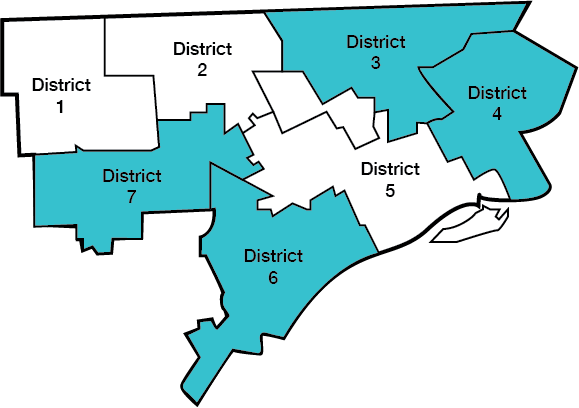79.5% of respondents had heard of the City of Detroit's Open Data Portal, and 51.5% of those cited a “Data Discotech”, “DDJC” or “AMP” as their first source of information.
Most recommended ways to inform Detroiters about the portal and encourage them to use it:
“free 101 trainings for the general public at libraries or community centers”
“advanced trainings in how to use and analyze the data for community leaders”
50% of respondents had been asked by a government agency to provide personal data they did not feel comfortable sharing
This information ranged from providing a social security number or bank account over email to questions about gender, marital status, income, criminal or arrest history, mental health and medical information.
37% of respondents have experienced a government agency collecting or sharing their information without consent.
Participants rated, on a scale of 1-5, whether a dataset “should be shared widely without restrictions” (1) or “should not even be collected, much less shared” (5).
Datasets to be shared most widely:
- “Locations of working and non-working streetlights”
- “Locations of stores that accept EBT cards”
- “Mayor's travel budget and schedule”
- “Names of donors to political candidates and campaigns”
- “Number and location of police brutality complaints”
- “Unedited police car dashboard camera footage”
- “Number of utility shut-offs at the block level”
Datasets that should NOT be collected or shared:
- “Names of anonymous informants to Child Protective Services”
- “Types of food purchased with SNAP benefits”
Undecided on what level these datasets should be shared.
Respondents have concerns about protecting privacy and anonymity:
- “Utility shut-off status at address (house or building) level”
- “Locations of houses entering foreclosure”
- “Locations of clusters of highly communicable diseases, i.e. tuberculosis or HIV”
- “Addresses where domestic violence complaints reported to DPD occurred”
For further discussion of potential benefits and harms of certain datasets, take a look at the results of our Data Justice Scenarios focus groups.
In the third section of the survey, participants were presented with a list of all datasets currently available on the City of Detroit’s portal and were asked an open-ended question about which data had the potential to be most useful or most harmful to themselves, their family or community.
Datasets that Help
Many participants said that basically every dataset on the list could likely provide some value. Their explanations included:
“I'm seeking to move back in the City of Detroit, so housing parcels, neighborhood conditions, and safety are important to determine where to live”
“People who don't have a car need to know where they can catch a bus”
Other respondents spoke to how different datasets are specifically meaningful to community organizers because they can
“help organizers make better, informed decisions about how to confront local issues”
have the power to “be helpful at the neighborhood level, diverting [perceptions of issues] from individual to systemic problems.”
Datasets that Harm
Most participants noted that the following data topics have potential to be harmful:
- foreclosure data
- property purchaser and ownership information, moreso about individual than company ownership
- locations of any victims of a crime, especially for domestic violence incidents.
Respondents explain that these data could:
- “Be manipulated to make certain areas appear more dangerous and preclude development there” and “give neighborhoods a bad reputation”
- “Lead to insurance red-lining” and “discriminate against families and neighborhoods”
- “Harm, embarrass, re-victimize or stigmatize victims of domestic violence”
- “Lead to more policing”
- “Put undocumented people in danger”
Datasets many respondents want added to the portal
- “Charter school data - who has the charter, their status, how many charters, how much funding”
- “Data on utilities - running water problems after housing demolitions, who are the contractors turning off water?”
- “All contracts past and present and bid open - include terms of contract with timing and area of effect. What performance measures and measures of satisfaction exist?”
- “Frequency of buses, map transportation earliest and latest run times, grocery and hardware stores (by depth of product) include services such as ride home and day care”
- “Government accountability - police activities, police brutality, political campaign info/spending” and “city council minutes”
- “Information on pollution, air and water quality are important”
